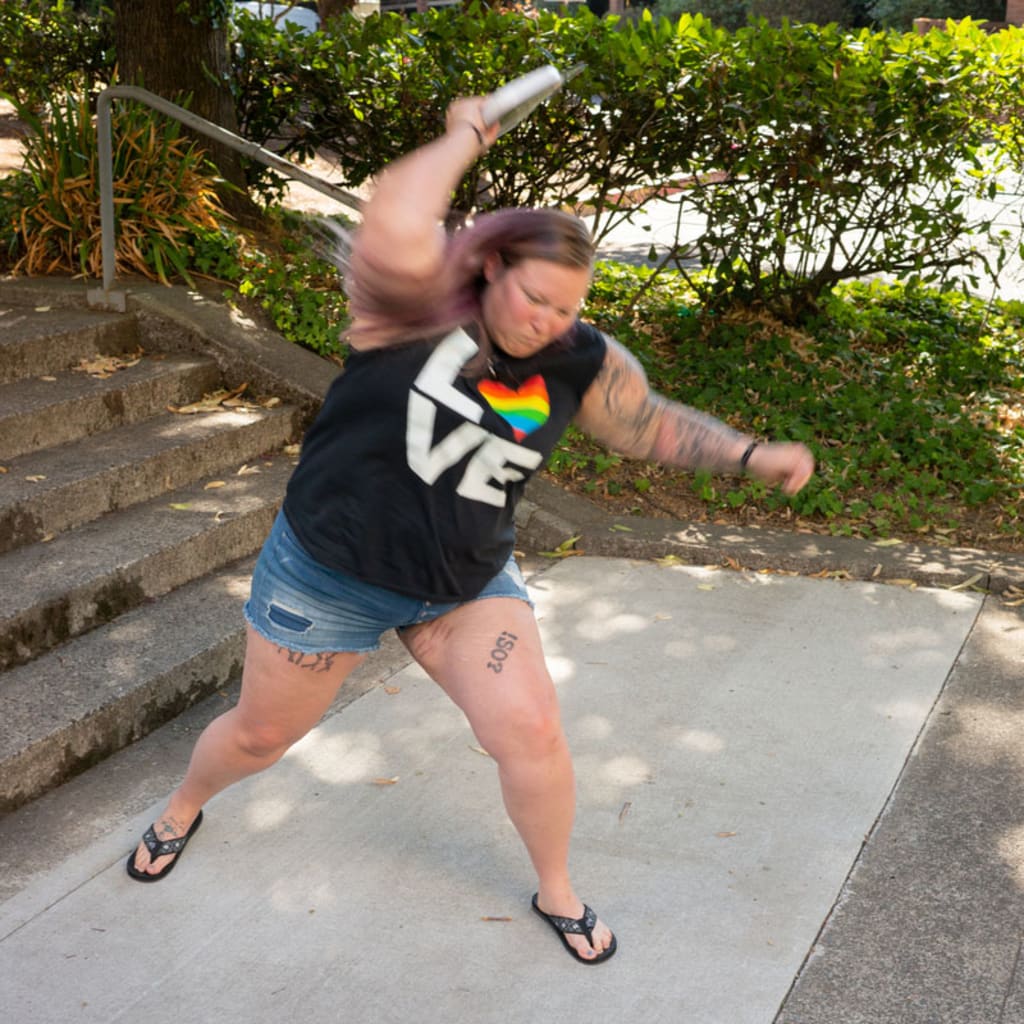A Fat Woman's War Cry.
On anti-fat bias, a lifetime of diets, and putting up a fight.

This post contains talk of dieting, disordered eating, and anti-fat bias. When I use the word “fat”, it is as a neutral descriptor. I treat ob*se as a slur, ‘cause it is one.
I’m fat.
I have always been fat. I don’t recall when my fatness started to be seen as a problem to be fixed, I just know it started young. I was taken to a dietician somewhere around age 10 where I was shown the food pyramid and what my plate should look like, as if I had control over my meals at that age.
I learned early on that being fat was a burden and being happy about being fat was weird. I was taught that my body was disgusting and wrong, and I internalized that until I didn’t. At some point my fatness became protection from unwanted advances and the expectation of eventual motherhood, but that’s a completely different kettle of fish.
A normal day consists of coffee from morning until the afternoon, sometimes with a meal replacement drink in there somewhere, then dinner and dessert. PCOS kicks my ass screaming for sustenance in the middle of the night, so I grab a snack. Peanut butter sandwich is my go-to. It must be something sweet. I eat if food is put in front of me. My preference is to avoid it, as too much food leads to digestive problems.
Or the wrong food. Or just food in general.
And I will sneak candy, knowing that I get judged for eating it at all. I don’t feel bad about this, just annoyed that I can’t indulge in something I enjoy every once in a while without having to be sneaky about it.
The same people that would shame me about being fat now give me shit for not eating. If I’m not hungry, I can’t eat. Whether I’m not hungry because of coffee or medication or because I don’t want to be is difficult to say. Gods forbid I say “I don’t want dessert”, for some reason.
In my 20s I found the body positive movement, then fat acceptance. In my 30s I found fat liberation. I learned that fatness is normal and that the pathologization of fatness is and always has been harmful. Science keeps finding out that intentional weight loss isn’t sustainable and is bad for you, but that isn’t the conclusion that the diet industry (or doctors that get a lot of money from the diet industry) want to see.
A happy fat person is a threat.
A fat person that can say, “That’s nice, anyway, what would you say to a thin person that was presenting the same problem?” is a threat.
I’m bringing this up because I was recently diagnosed with ADHD, and my ADHD doctor has made some choices that appear to be driven by weight bias. The fact that this doctor is also a bariatric specialist is not lost on me and why I spend a lot of time on edge, but dammit, options are limited here.
In telling me the benefits of Vyvanse versus other ADHD medications, his main point was that Vyvanse is also prescribed to treat binge eating disorders and that, at high enough doses, it will reduce my appetite and help me lose weight!
I have never mentioned having an issue with my weight.
Not once.
But, because I’m fat, it’s assumed.
(This doctor also has some connection to a theory that untreated ADHD has a hand in people being unable to lose weight, or something, it’s weird, but it’s hard enough to get diagnosed and medicated as it is.)
It’s also assumed that I binge eat because… I said I get cravings sometimes. Once. But I don’t feel bad after satisfying the craving. My body says, “I need this,” and I give it what it’s after and we’re good. That’s the entire point.
When he tried to ask about my size in my last appointment I shut him down immediately: “I’m not here about my weight, I’m here about my brain.”
Finding out that PCOS fucks with insulin levels and can result in insulin resistance, and that this part of PCOS causes cravings and hunger because my body’s signals are fucked and it thinks I need more fuel when I don’t—well, that was fascinating. Because of that, people with PCOS can be flagged as pre-diabetic and have higher glucose levels than normal in a fasting blood test. And on, and on, with every single problem that has come up in blood tests of late.
Because of anti-fat bias in medical care, though, I had to accidentally find that out myself. My next step is to talk to my OBGYN and see what to do.
Knowing the things I do, understanding that fat isn’t a disease and isn’t a reflection of my character, it doesn’t erase the damage that’s been done.
I don’t know if I’ll ever heal from the childhood diets, medicine’s anti-fatness, or even the attitudes of my peers over the years. I don’t know if I will ever have a normal relationship with food ever again.
But I will fight for myself and for my right to proper, fact-based, unbiased medical care, and if that means arguing with authority figures on a regular basis, then so fucking be it.
About the Creator
MissieKatjie
Loves Star Trek, cats, tallships, lost expeditions, and macabre things. Adult with ADHD. Wrangles vintage graphics into digital products and sells vintage stuff. Knows many things, finds it difficult to apply them.






Comments
MissieKatjie is not accepting comments at the moment
Want to show your support? Send them a one-off tip.